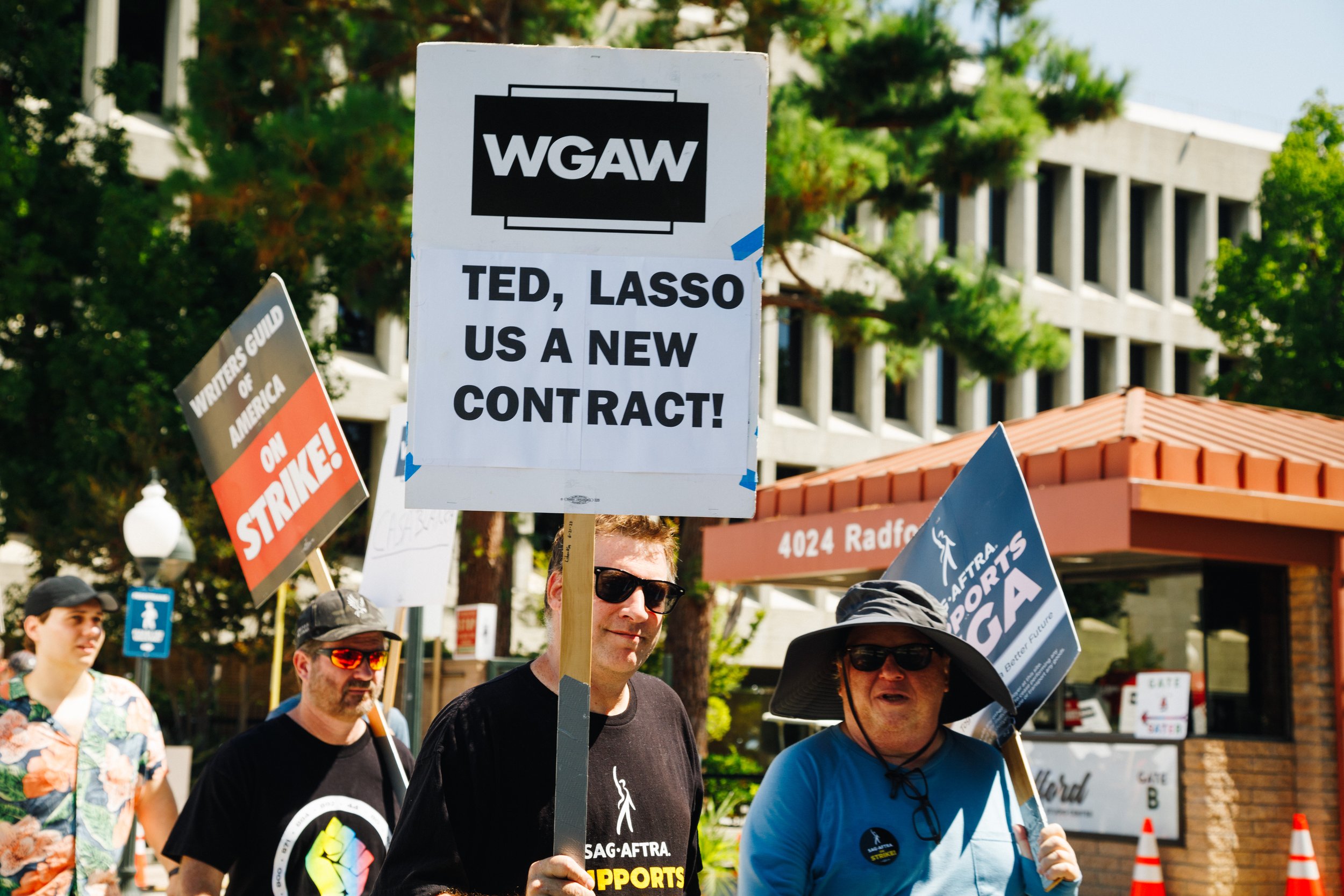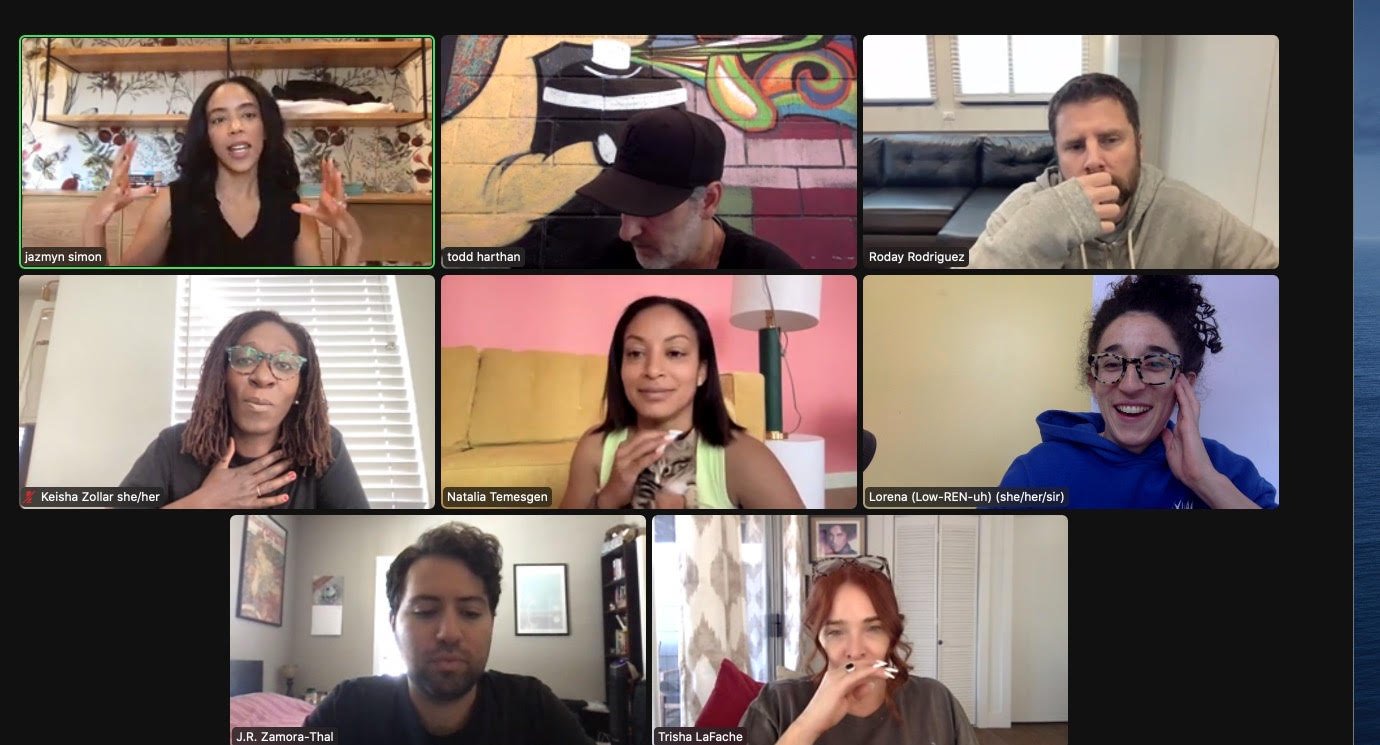Hollywood Without Hollywood: The 2023 Writers Strike
Why We Need Our Writers Now More Than Ever
by Kaamya Krishnan
On the picketing line at Radford Studio Center (Photo Courtesy of Brittany Woodside)
Actress and writer Jazmyn Simon shares her experience with the Writers’ Strike and what it means for film and television going forward.
After the clock struck midnight on Wednesday, September 27, the 2023 Writers Strike officially came to an end, marking 148 days of dedicated strike action by the Writers Guild of America (WGA). On May 2, 2023, the WGA, which represents about 11,500 screenwriters, went on strike as their “negotiation with the studios and streamers has failed to reach an agreement.” However, what feels novel is history repeating itself.
In 1988, the WGA went on strike for 154 days, and then again in 2008 for 100 days. This year’s strike being the second-largest strike since the 1980s is indicative of repeated unfairness in the workplace. Those who make up the Writers Guild are the labor force that make television shows and films happen. These individuals were not being paid an adequate amount for the work done, so the result is action through strike and protest.
Picketers were seen protesting with signs in hand across major production cities, especially Los Angeles and New York City. Writers on strike were intent on coming to a new agreement with the Alliance of Motion Picture and Television Producers (AMPTP), who refused to compensate writers according to their requests. In the picket lines, the incessant sound of car horns honking with passion and purpose serve as a necessary reminder that people were coming together to fight for a good cause.
100 Days Stronger at FOX (Photo Courtesy of Jack Herman)
I spoke with actress, television writer, and author Jazmyn Simon on her thoughts on the strike. In her words, the strike was necessary “so that writing for TV and film could stay a career. Writers need to be paid for their work so they can continue to… you know, pay rent and buy food.”
The undeniable rise in streaming services has perpetuated this issue of lack of pay for writers. Nowadays, it feels like virtually every television channel that was once on cable has made its way into the world of streaming, especially since the outbreak of COVID-19. In 2020, global streaming services hit and surpassed the milestone of one billion subscriptions worldwide. Furthermore, we now find ourselves drowning in choices, calculating just what streaming bundle will give us the maximum amount for services for a so-called smaller price. As large television and motion picture studios take advantage of the advent of streaming services, compensation for writers gets left in the dust while viewers sit behind screens expecting more.
But the rapid-releasing streaming services aren’t the only antagonizers of Hollywood’s writers. Artificial intelligence is taking its toll as well. Have you ever seen a movie that truly made you cringe, that had you tensing up at the dialogue and succumbing to feelings of second-hand embarrassment? You can likely blame this on poor writing. Artificial intelligence is no replacement for the nuances and complexities of human emotions.
One of the main goals accomplished by the strike was to limit the use of artificial intelligence as a replacement for human writers. When shows and movies are released without care and attention, viewers can tell. With writers on strike, artificial intelligence-created productions risked being greenlit, which would completely jeopardize the integrity and value of a real screenwriter’s efforts and the subsequent projects that production companies release.
“AI doesn’t have childhood trauma, so whatever they came up with would have been trash,” said Simon.
Simon has worked in writers rooms, on film and television sets (most notably the 2015 TV comedy Ballers and the Psych movies), and is a New York Times bestselling author of two children’s books. She is well-versed in the world of writers, their efforts, and the urgency of such a strike. In her last staff writing job for television during the pandemic, Simon had to participate in writers rooms through Zoom, yet these writers held the same dedication and intentionality within the virtual space.
“We created every single detail,” she said. “My next writer’s room job, I will be either a staff writer again or a story editor. Either way, I will get paid to write make-believe."
Photo Courtesy of Jazmyn Simon
This is the power of our writers. Writers have proven to be the backbone of the film industry and important figures in sharing stories with the world.
The urgency of this strike becomes clear as screenwriters struggle with a lack of job security, among other contractual issues between studios and their writers.
The Drew Barrymore Show, for example, received backlash after Barrymore announced her show would resume filming amidst the strike. It returned to daytime television on October 16, however the show’s Emmy-nominated writers Chelsea White, Cristina Kinon, and Liz Koe, will not be returning to its writers room. Their resignation from the show looks to be an act of solidarity with the WGA’s efforts and a wake-up call for the show’s production to move forward in compliance with the guild or risk consequence.
It’s very possible that throughout the strike you didn’t even notice it was happening, as there is no shortage of old movies and TV shows to view on streaming platforms, and many of today’s shows take what seems like ages to release a new season anyway. As audience members, we aren’t taught to conceptualize or even comprehend the daunting contracts that take place to make our favorite productions happen.
The production process of film and television shows has always been a point of interest for me, from the inception of an idea all the way through to the press and marketing of completed projects. As someone on the other side of the screen, it’s quite easy to turn a blind eye or simply be unaware of how such a strike can impact those involved firsthand. The collateral damage of a strike means months without pay for writers.
“The industry suffered, and is still suffering,” Simon said of the strike’s consequences. “When writers and actors are on strike, it affects the teamsters, the International Alliance of Theatrical Stage Employees (IATSE) members, it affects local restaurants and catering companies. It affects everyone.”
Over nearly five months, the 2023 Writers Strike played out like its very own dramatic production. Although the union suspended pickets and the deal with AMPTP was ratified, the Screen Actors Guild-American Federation of Television and Radio Artists (SAG-AFTRA) remained on strike after joining in mid-July. This act of extended strike furthers the demands of the entertainment workforce and makes an impact on how large studios and trade associations will view these unions in the future.
“We can have all the writers and all the directors available, but without an actor we still can’t work, which means a great deal of people are still struggling. We are all stronger together, which is why unions are key!” said Simon. The SAG strike ended on November 9, after nearly four months of striking in solidarity with the WGA.
SAG-AFTRA Secretary-Treasurer Joely Fisher and her Norma Rae sign at the SAG-AFTRA L.A. Solidarity rally at Paramount, 9/13 (Photo Courtesy of Jerry Jerome)
Simon found the experience of picketing for fair wages exhilarating.
“You felt like you were fighting for your rights for fair wages. Then once SAG also went on strike and it was a double strike, it became like a high school reunion. You got to see people you haven’t seen in years,” she said.
Those individuals on the picket lines are parts of a greater whole. Their action, solidarity, and union are a testament to the power of the entertainment industry and how deeply and broadly it affects people.
For those of us aspiring to work in entertainment, the industry seems precarious and unpredictable. However, Simon has wise words for us.
“That shouldn’t stop you from jumping in, head first,” Simon said. “Keep your heads up and keep striving.”
When I started writing this piece, it was during the middle of both the WGA and SAG strikes where a lot of uncertainty about the outcome was in the air. The progression of the strike influenced my approach to how I wrote about an event that was actively evolving and changing, day by day. It was a sigh of relief to see the strike was over. With the reminder Simon has left me, I feel confident that the entertainment industry, Hollywood, and every individual who makes productions come to life (from the top of the totem pole to the bottom) will continue to come together in uncertain times of need to fight for what people deserve.
You can view a simplified version of the new Writers Guild of America contract here.




